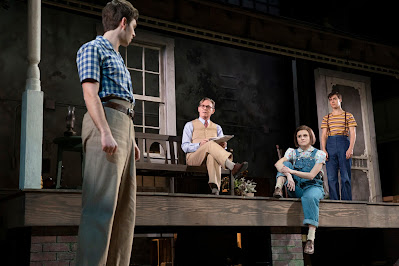Reviewed by James Karas
The Lehman Trilogy is an epic play about the rise of the Lehman family from German immigrants to the United Sates to the billionaires and owners of Lehman Brothers, a conglomerate of businesses that descended into the largest bankruptcy in American history.
The play takes us from 1844 when Henry Lehman, “a circumcised Jew with only one piece of luggage” arrived at the port of New York. After a tough and highly educational crossing of the Atlantic, he comes face to face with America that he sees as a magical music box. It is the story and vision of many immigrants.
He goes to Montgomery, Alabama where he works hard in a clothing store and saves his money. He opens his own store. His brother Emmanuel arrives and then Mayer, the third and last brother, follows him. They expand their business and the sign LEHMAN BROTHERS in gold letters is prominently displayed. They are on their way up.
The Lehman Trilogy is based on Stefano Massini’s writing as adapted by Ben Power. It has only three actors, Ben Carlson as Henry Lehman, Graeme Somerville as Emmanual and Jordan Pettle as Mayer. They take on many roles but essentially remain the original three brothers and their progeny and some other characters until the 21st century.
The play is written in verse and it is an epic in the Homeric sense where a bard tells a heroic story to an audience, in this case us. Each brother speaks his own lines but also describes other events in the history of the three brothers and the company. After a fire destroys their store in Alabama, they go into the sale of equipment to cotton plantation owners and are paid in cotton. They sell the cotton to the mills and make a handsome profit.
The play is episodic and we move on to 1855 when Henry dies but he remains in the play and continues to address the audience and speak for other characters.
Lehman Brothers expands and diversifies They conquer New York and survive the great depression and they establish businesses around the world. The last Lehman in an executive position is Bobby who dies in 1969. The final scene of the trilogy is an imaginary dream play. What starts as a Homeric epic ends as a Greek tragedy. Hubris takes over and pushes sound thinking to the side. They speak of immortality, of taking over the world. Much of the discussion uses Wall Street language and what was a story of three brothers doing well gets muddled with ambition, greed, corporate wars and money, lots of money.
There is a surreal scene where Bobby Lehman dances the twist and everyone is dancing. The Russians, the Chinese, CEOs Dick Fuld, “the Gorilla,” and Lew Glucksman dance as does Bobby to age 120. He died in 1969. It is a confusing scene that may make poetic sense.
The play ends on an elegiac note recalling the past and the big changes with Pete Peterson taking over and being pushed out by Dick Fuld and becoming a billionaire in the processes. They recall the three brothers opening a store in Alabama, surviving fire and flood and standing together dreaming of America.
The Lehman Trilogy is a hugely successful play and a hit wherever it has been produced. It has won praise and awards galore. But I cannot share in all the enthusiasm it has generated. It is a three-act play that runs for 3 hours and 20 minutes with two intermissions. A three-act play does not become a trilogy because it covers to a greater or lesser extent the period of 1844 to 2008. The Lehman Trilogy seems like the story of the Lehman family, especially the founding three brothers who are the main characters of the play. But the heirs of the founders ceased having any control in the company in 1969 and therefore had nothing to do with the 2008 bankruptcy of the huge enterprise that bore the name Lehman.
The mammoth company called Lehman Brothers that engaged in fraud and caused immeasurable harm to people in 2008 does not figure all that prominently in the play. It was a complex affair and the three Lehman brothers and their heirs that tell the story are not the right people to tell us about it. they had nothing to do with the company after 1969.
The bankruptcy of Lehman Brothers is the most important event in the company’s but not the family’s history and it is skimmed over. It was caused by greed and fraud on an unimaginable scale. If you consider the fraud, skullduggery and devastating effect on investors, employees and ordinary people who had borrowed money on subprime mortgages and lost their houses, you will not find it in this play. The rise of the Lehman brothers may well be an epic story worth telling but surely the devastating effect on the people who suffered from its bankruptcy is at least as important.
Ben Carlson, Graeme Somerville and Jordan Pettle are outstanding actors who give stunning performances. They speak directly to the audience, speak to each other and represent other characters with finesse and inherent talent.
Camellia Koo’s set does little to indicate the changes in locations from the New York dock to Alabama to New York over well over a century.
The Lehman Trilogy by Stafano Massini, adapted by Ben Power in a production by Canadian Stage continues until December 2, 2023, at the Bluma Appel Theatre, St. Lawrence Centre for the Arts, 27 Front Street East, Toronto, Ontario. www.canadianstage.com









.jpg)
.jpg)






